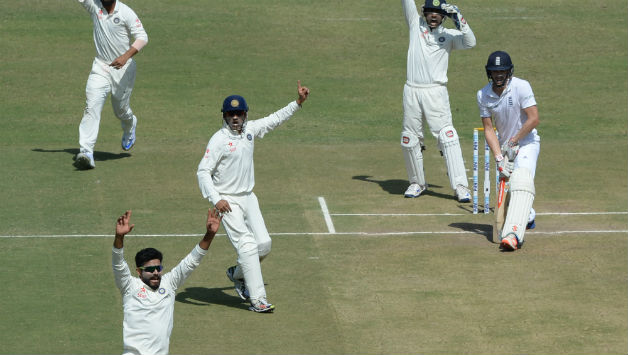
Cricket Country Staff
Editorial team of CricketCountry.
Written by Cricket Country Staff
Published: Nov 11, 2016, 01:46 PM (IST)
Edited: Nov 12, 2016, 09:29 AM (IST)


After all the hullabaloo, Decision Review System (DRS) finally made its debut in India for England series. Indian Cricket Team, which is currently the top Test side in ICC Rankings had this technology on hold for a long period by finding it not a fully developed system. Although, after Indian Test captain Virat Kohli and coach Anil Kumble‘s acceptance over DRS, the system finally made its India debut with the ongoing series against England. In the first Test of the series at Rajkot, the first DRS review of the match was taken when Haseeb Hameed was given out by the on field umpire after being trapped lbw by Ravichandran Ashwin. Well, it went to India’s favour as the umpire decision was kept because the batsman was genuinely out. Full Cricket Scorecard: India vs England 1st Test at Rajkot.
England, who scored a mammoth total of 537 in the first innings, failed to use DRS properly. It began with Hameed’s dismissal. Hameed was out and was given the same decision by the third umpire after reviewing it. Their next review was of the last wicket, which also didn’t go in their favour. Earlier, England captain Alastair Cook did not review his dismissal, a mistake as he was originally not out. This way, England used DRS when they should not have and did not use it where they should have. With DRS coming into the act, there will be surely some increase in the excitement in the game and since this technology is being used for the first time in India, the official YouTube Channel of StarSports has came up with a video on how it works from behind the scenes.
It seems India are not keen on using DRS very often as they have taken only one review so far in this match and it is probably because they are not friendly with this technology.
This website uses cookies so that we can provide you with the best user experience possible. Cookie information is stored in your browser and performs functions such as recognising you when you return to our website and helping our team to understand which sections of the website you find most interesting and useful.
Strictly Necessary Cookie should be enabled at all times so that we can save your preferences for cookie settings.
If you disable this cookie, we will not be able to save your preferences. This means that every time you visit this website you will need to enable or disable cookies again.
